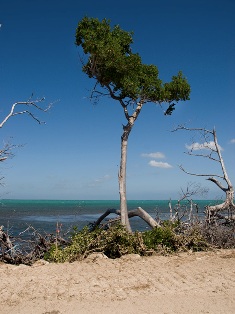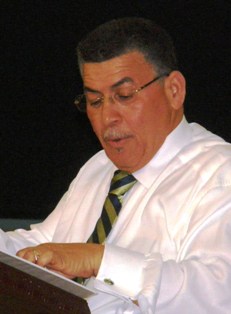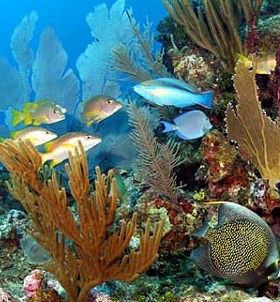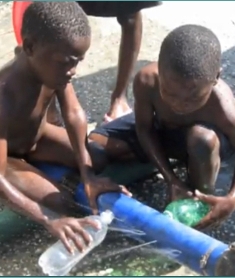Archive for October, 2010

World Bank to lead push on nature protection
 (BBC): The World Bank has launched a global partnership aimed at helping countries include the costs of destroying nature into their national accounts. Ten nations will take part in the pilot phase, including India and Colombia. The bank’s president Robert Zoellick said environmental destruction happens partly because governments do not account for the value of nature. "We know that human well-being depends on ecosystems and biodiversity," said Mr Zoellick. "We also know they’re degrading at an alarming rate. "One of the causes is our failure to properly value ecosystems and all they do for us – and the solution therefore lies in taking full account of our ecosystem services when countries make policies." (Photo by Dennie Warren Jr)
(BBC): The World Bank has launched a global partnership aimed at helping countries include the costs of destroying nature into their national accounts. Ten nations will take part in the pilot phase, including India and Colombia. The bank’s president Robert Zoellick said environmental destruction happens partly because governments do not account for the value of nature. "We know that human well-being depends on ecosystems and biodiversity," said Mr Zoellick. "We also know they’re degrading at an alarming rate. "One of the causes is our failure to properly value ecosystems and all they do for us – and the solution therefore lies in taking full account of our ecosystem services when countries make policies." (Photo by Dennie Warren Jr)

Robbers attack with machetes
 (CNS): A resident was attacked by two masked robbers armed with machetes early this morning as he was entering his home. George Town detectives are now investigating the robbery, which took place in Mahogany Way around 12.40 am Thursday. As he entered his house, the victim was suddenly confronted by the men, one of whom pushed him to the ground, demanded cash and struck him with a machete. Both men then forced their way into their victim’s home before making off with a quantity of cash and jewellery. Despite the attack, police said the victim did not require any medical attention following the incident.
(CNS): A resident was attacked by two masked robbers armed with machetes early this morning as he was entering his home. George Town detectives are now investigating the robbery, which took place in Mahogany Way around 12.40 am Thursday. As he entered his house, the victim was suddenly confronted by the men, one of whom pushed him to the ground, demanded cash and struck him with a machete. Both men then forced their way into their victim’s home before making off with a quantity of cash and jewellery. Despite the attack, police said the victim did not require any medical attention following the incident.
The first of the suspects is described as 5’8” in height, dark complexion, medium build, wearing a white cloth over his face carrying and had a Caymanian accent. The second is 6’ in height, slim build with a mask over his face. He was wearing dark jeans and a light coloured shirt and spoke with a Jamaican accent. Both of the robbers were armed with machetes, the police said.
Anyone who has any information about this crime, or who was in Mahogany Way at the relevant
time and saw anything suspicious, is asked to call George Town police station on 949-4222, or
the confidential Crime Stoppers number 800-8477(TIPS).

Mac defends loan decision
 (CNS): The premier has defended his decision to reject recommendations from the Central Tenders Committee over the funding of government’s CI$155 million loan, stating that he did so in the best interests of the country. In a television address on Wednesday evening Premier McKeeva Bush said that the financing deal government had secured with the New York based Cohen and Company would save the country millions and millions of dollars. Justifying why the CTC recommendation had not been accepted, he said that the concept of negotiating for a better deal does not exist within the current central tendering process and he was not satisfied that a joint bid from two local banks offered the best deal.
(CNS): The premier has defended his decision to reject recommendations from the Central Tenders Committee over the funding of government’s CI$155 million loan, stating that he did so in the best interests of the country. In a television address on Wednesday evening Premier McKeeva Bush said that the financing deal government had secured with the New York based Cohen and Company would save the country millions and millions of dollars. Justifying why the CTC recommendation had not been accepted, he said that the concept of negotiating for a better deal does not exist within the current central tendering process and he was not satisfied that a joint bid from two local banks offered the best deal.
As a result Bush revealed that he had spoken with Cohen and Company directly when he was in New York attending the UN conference last month and asked them to submit a proposal to the Treasury, which also included financing for Cayman Airways as well as a competitive interest rate.
“I received copies of an amended proposal from Cohen and Company in mid-October. This proposal provided an innovative solution that enables government to limit its interest rate. So this proposal allows government to benefit from the current low interest rates while guaranteeing that the interest rate will never go above the agreed fixed rate,” Bush told the people in his address on Wednesday evening. “This saves the Cayman Islands Government tens of millions of dollars,” he said, adding that it was not yet possible to give an exact figure until the long term financing facility is finalised. He said, however, that over the remainder of the current fiscal year government would save many more millions of dollars with this proposal than it would have with the Central Tenders Committee’s recommended tender.
“As minister of finance my duty and that of my government is to make sure that we are managing government’s finances in such a way that we are not creating tremendous hardship on our own people and not recklessly mortgaging the future of generations to come,” the premier stated. “It is my considered view that CNS and Rooster FM have maliciously criticised the government. The Opposition have been jumping to conclusions, as well. However, their mismanagement of government funds is one of the reasons why we have to borrow so much now.”
He also pondered why the opposition could not figure out that there was good enough reason in the bad financial times for government to try and save money. But he also pointed to the New York firm’s ability to provide the funding for Cayman Airways and refinancing needs surrounding its debt and “related to the historical shareholder deficiency”, which, he said, would allow the airline to function more effectively as a strategic driver of tourism growth and economic development.
“I did not take overriding the selection of the Central Tenders Committee lightly,” Bush revealed. “As finance minister and premier I was duty bound to get the best terms possible on this funding … I had to decide whether to choose substance or to choose process.”
He added that he believed the best interests of the Cayman Islands were served by overriding the selection of the Central Tenders Committee. “I did not do this without taking advice as to my authority to do so,” the premier added, stating that he was confident that he had acted in the best interests of these Islands in selecting Cohen and Company. He also said that the entire transaction has been above board and no member of the United Democratic Party has any financial interest in Cohen and Company whatsoever.
The premier went on to say that the tendering process needs to be revamped and he had already asked for the auditor general’s assistance in making recommendations for changes to the tendering process that “will result in a more efficient, modern and sensible process,” he stated.

We must act decisively to save our world
(CNN): This week, I have had the opportunity to meet with ministers and country delegates from around the world who have gathered in Nagoya, Japan, to set a global conservation action plan for the next ten years. This is a critical moment in time for environmental ministers gathered here to work together to set bold, ambitious targets to protect nature and the services it provides.
Decisions made here will not only impact our planet’s environmental health, but every person, family, and nation that depend on nature to survive and thrive.
Biodiversity is the foundation of all life on Earth. Human societies cannot provide for themselves the essential services provided by nature and healthy ecosystems. Among them: A stable climate, clean air, fresh water, insect populations that pollinate our food crops, healthy soils, and sources of pharmaceuticals for human health.
Actor and environmentalist Harrison Ford is also the Vice Chairman of Conservation International, an organization that seeks to protect and conserve the Earth’s natural resources. He’s at the Convention on Biodiversity conference in Nagoya, Japan where delegates are working to agree new targets for biodiversity over the next 10 years.

UK’s internet industry worth £100bn
 (The Guardian): The internet is worth £100bn to the UK economy, more than 7% of national income, according to a report out today. If it were an industry in its own right, the internet would be more than twice as large as the UK hotel and restaurant market and nearly as big as the financial services sector, which accounted for 9% of GDP in 2009, the study says. The findings come in a report for Google, the internet’s most successful company. The study, by Boston Consulting Group, US consultants, places a value on the UK internet market for the first time. BCG partner Paul Zwillenberg, one of the report’s authors, said the internet is giving UK companies access to international markets and allowing them to generate "astounding" growth. The report finds that British consumers’ willingness to shop online was powering the internet’s expansion.
(The Guardian): The internet is worth £100bn to the UK economy, more than 7% of national income, according to a report out today. If it were an industry in its own right, the internet would be more than twice as large as the UK hotel and restaurant market and nearly as big as the financial services sector, which accounted for 9% of GDP in 2009, the study says. The findings come in a report for Google, the internet’s most successful company. The study, by Boston Consulting Group, US consultants, places a value on the UK internet market for the first time. BCG partner Paul Zwillenberg, one of the report’s authors, said the internet is giving UK companies access to international markets and allowing them to generate "astounding" growth. The report finds that British consumers’ willingness to shop online was powering the internet’s expansion.

DoE to grow marine parks
 (CNS): A new research project has been launched by the Department of Environment with the goal of increasing the amount of Cayman’s marine habitat under official protection. With only 17% of the islands’ shelf currently designated as marine parks and given the increasing global as well as local pressure on the delicate reef systems, the department says it would like to set aside 30% of the surrounding marine environment for protection. It is more than twenty-five years since Cayman led the way by setting aside marine habitat in specially zoned parks, which have proved invaluable. However, with climate change and a growing population there is now a pressing need to enhance those parks.
(CNS): A new research project has been launched by the Department of Environment with the goal of increasing the amount of Cayman’s marine habitat under official protection. With only 17% of the islands’ shelf currently designated as marine parks and given the increasing global as well as local pressure on the delicate reef systems, the department says it would like to set aside 30% of the surrounding marine environment for protection. It is more than twenty-five years since Cayman led the way by setting aside marine habitat in specially zoned parks, which have proved invaluable. However, with climate change and a growing population there is now a pressing need to enhance those parks.
The three year project to assess the condition and challenges faced by the Cayman Islands’ marine environment is being partially funded by the UK’s Darwin Initiative and supported in kind with resources, manpower and expertise from the US Nature Conservancy and the School of Ocean Sciences at Bangor University in Wales, as well as the DoE. The goal is to gather further scientific data about the local marine environment, beaches and mangrove areas to see what impact coral bleaching, rising acidity, fishing levels and other factors have had on the islands’ oceans.
Speaking at a special launch of the project on Wednesday morning, the director of the Department of Environment, Gina Ebanks-Petrie, explained that the project would help the DoE make the case for enhancing the parks and protecting a greater percentage of marine habitats.
She said that when the marine parks were first designated, many of the modern threats facing reefs and other marine habitats that exist today were not even a consideration. When the parks were designated they were done mostly to protect the reefs from divers and anchor damage, as well as some over fishing, but today there are far more pressing and aggressive threats to the wider marine environment.
“We hope to increase the total protected area to 30% and we believe we can get the message out to demonstrate that this is the very least we will need in order to protect the marine environment in future,” the DoE Director said.
Joined by Dr John Turner from the School of Ocean Sciences and James Byrne from Nature Conservancy at the launch of the campaign, Ebanks-Petrie said that the data they would collect during the project added to the knowledge, information and experience of managing the existing parks that the DOE already had, would be used to make the a proper scientific case for enhancing the parks and she hoped it would be broadly supported by the public. She also added that the findings would be presented during the project period at public consultation meetings.
Dr Turner explained that designating protected areas was not just about immediate conservation but about making reef systems resilient enough to recover from damaging impacts and environmental hazards such as bleaching events or storms.
“We must ensure that marine ecosystems such as coral reefs maintain their capacity to recover from major impacts,” he said. “If these systems lack resilience, then economic losses incur as property and critical infrastructure become insecure, fish catches reduce, other species and habitats such as turtles, seabirds, sea grasses and mangroves decline, and tourism revenue is lost.”
Byrne emphasised the point that the reefs here still had considerable diversity and there were small pockets of recovery of some species of coral and fish which had virtually disappeared in other parts of the Caribbean. The aim of protection was to give the reefs a better chance at future recovery and sustainability. He also noted that as protected areas grew in diversity and species, those fishes and other corals would spread to a wider area, enhancing the marine system outside of protected areas as well. “This is about a wider more sustained recovery and not just about preserving the last remaining reef or marine habitat,”he said.
Ebanks-Petrie pointed out that the goal was be to have the enhanced marine parks protected under the new National Conservation Law, which she said she now believed would be going before the Legislative Assembly early next year. “We need the law passed so that we will be able to manage and protect the enhanced areas and make the marine parks effective,” she added.
Cayman had once led the way in marine conservation, the experts pointed out, and said that it could do so again with this project.

Top doctor tells public to stay away from Haiti
 (CNS): Following a cholera outbreak in Haiti, Cayman’s Medical Officer of Health Dr. Kiran Kumar has issued a travel warning advising residents to avoid the country unless it is essential. The World Health Organization (WHO) has reported that 259 people have been killed by cholera in Haiti following well over three thousand confirmed cases. “We advise that residents travel to Haiti only when necessary. If you have to go, take vital precautions such as ensuring hygienic food preparation, boiling or purifying all water, and washing hands often with soap and clean water. Travellers should also carry an ample supply of oral rehydration salts,” said Dr. Kumar.
(CNS): Following a cholera outbreak in Haiti, Cayman’s Medical Officer of Health Dr. Kiran Kumar has issued a travel warning advising residents to avoid the country unless it is essential. The World Health Organization (WHO) has reported that 259 people have been killed by cholera in Haiti following well over three thousand confirmed cases. “We advise that residents travel to Haiti only when necessary. If you have to go, take vital precautions such as ensuring hygienic food preparation, boiling or purifying all water, and washing hands often with soap and clean water. Travellers should also carry an ample supply of oral rehydration salts,” said Dr. Kumar.
Cholera is an acute intestinal infection caused by ingesting contaminated food or water. It causes rapid watery diarrhoea that leads to severe dehydration. However, according to WHO figures, up to 80 percent of cases can be treated successfully with oral rehydration salts.
The disease is spread through water which may be tainted by the faeces of infected persons or by untreated sewage. Food can be contaminated by using this tainted water or by being handled by someone who has cholera.
While an oral cholera vaccine exists, it is usually only stocked by countries where cholera is endemic. Currently, the vaccine is not available in the Cayman Islands or the US. The US Centres for Disease Control does not recommend the vaccine for travellers to cholera endemic countries, as it offers incomplete protection.
“We will explore the feasibility of procuring some doses for travellers to Haiti. However, because it is a two-dose vaccine, multiple weeks can elapse before persons receiving the vaccine are protected. So even when people are vaccinated, they should still practice standard prevention and control measures,” Dr. Kumar explained.
He urged travellers returning from Haiti to contact a doctor immediately, and state their travel history, should they develop diarrhoea within five days.
Even if not vaccinated against cholera, travellers to Haiti can greatly reduce the risk of contracting the disease by following these practices:
Drink only bottled, boiled or chemically-treated water and/or bottled or canned beverages.
Ensure that seals are unbroken when using bottled drinks.
Disinfect your own water: boil for one minute or filter the water and add two drops of household bleach or half an iodine tablet per litre of water.Use bottled, boiled or chemically-treated water to wash dishes and brush teeth.
Use ice in your drink only if you know it was made from boiled or treated water.
Wash your hands often with soap and clean water.
Clean your hands before you eat or prepare foods and after using the bathroom.
Eat foods that have been thoroughly cooked and are still hot, or fruit that you have peeled yourself.
Cook all vegetables. Do not eat salads or other raw vegetables.
Do not buy food or beverages from street vendors.

Public forum to tackle question of direct taxation
 (CNS): Members of Generation Now are hoping for an impressive turnout this evening for the next in their series of topical discussions. Following their recent public forum on the controversial issue of legalising gambling, the local advocates for critical thinking, will be taking on the even thornier topic of direct taxation at the Harquail Theatre on Thursday evening. “Taxation: Is Cayman’s revenue base sustainable or is direct taxation inevitable?” will be the subject of discussion. Organisers say that debate on the topic so far has focused of its impact on the financial services sector but Generation Now hopes to air the issues in context of the domestic economy.
(CNS): Members of Generation Now are hoping for an impressive turnout this evening for the next in their series of topical discussions. Following their recent public forum on the controversial issue of legalising gambling, the local advocates for critical thinking, will be taking on the even thornier topic of direct taxation at the Harquail Theatre on Thursday evening. “Taxation: Is Cayman’s revenue base sustainable or is direct taxation inevitable?” will be the subject of discussion. Organisers say that debate on the topic so far has focused of its impact on the financial services sector but Generation Now hopes to air the issues in context of the domestic economy.
Donald Spence, one of the Generation Now directors, said that the group wanted to broaden the scope of the discussion. “We want to determine the pros and cons of the current system of indirect taxation versus a system of direct taxation and any perceived impact on the Cayman Islands from a socio-economic perspective that such measures would have on our local economy.”
The debate is open to the public and starts at 7pm and it will also be broadcast on Radio Cayman this evening. The panel includes Anthony Travers, former partner of Maples and Calder and Chairman of Cayman Finance; Paul Byles, MD of Focus Consulting, economist and author; Wil Pineau, CEO of the chamber of Commerce, Tom McCallum of McCallum Solutions; and Steve McIntosh, CEO of CML Offshore Recruitment.
The forum will be moderated by Austin Harris who will put questions that have been emailed in from the public. The live audience will also be putting questionsdirectly to the panel members.
The event will take place on Thursday 28 October 7:00 pm – 9:30 pm at the Harquail Theatre the event is free to the public however organisers will be asking for voluntary donations to help with costs.
Justice was served in Girvan case, say finance cops
(CNS): The financial crime’s unit of the RCIPS said on Tuesday that they were very pleased with the sentence handed down to Robert Christopher Girvan the fund manager who stole almost $19million in a complex financial fraud relating to four local hedge funds. The FCU had spent some 18 months on the case and the officer in charge of the investigation described it as a complicated and protracted enquiry. “The hard work and dedication of everyone involved in the investigation was rewarded with the sentence given by the courts,” said Detective Constable Richard Clarke (left). “We are absolutely delighted that such a substantial sentence and confiscation order was imposed.
The courts seized more than $4.4million in a confiscation order under the Proceeds of Crime Act and Justice Alex Henderson sentenced Girvan to eight years in jail for his crimes.
“It sends out a clear message to those who see financial crime as quick route to easy cash that the penalties are severe. You risk facing several years behind bars and losing all of the cash and assets you accumulated as a result of your criminal activity,” Clarke added. “Tuesday was a good day for the Cayman Islands justice system. We hope that the many victims who lost money because of the crimes committed by this man will also feel that justice has been served.”
Girvan had pleaded guilty to 22 counts of the original 27 made against him of theft, fraud and money laundering. It is understood that civil proceedings regarding the payment to creditors in the four Grand Island Funds which Girvan was managing are continuing and it is unclear exactly how much investors will eventually be repaid.
East End port plans official
(CNS): Recent speculation that property developer Joseph Imparato was planning to build a commercial port in the district of East End was confirmed on Wednesday morning when he revealed that a proposal had been submitted to the Cayman Islands Government for consideration. In a press release Imparato said the ‘East End Seaport’ would be a maritime infrastructure project facilitating five different types of marine based commercial activities, as well as a selection of complementary land based activities. These include a commercial cargo port, hydrocarbon storage facility, cruise ship home port, transhipment of containerised cargo and a luxury mega yacht marina.
The concept of creating a commercial port in the East End, High Rock area has raised considerable controversy across Grand Cayman as well as in the district itself, in particular from the local MLA Arden McLean. However, Imparato has said he will be holding a series of public meetings in the coming weeks, allowing the people of the Cayman Islands to take a closer look and learn the facts about the proposed East End Seaport.
Addressing some of what he said were the misconceptions circulating in the community, the property developer said in the release that the seaport would be developed on privately owned land and would be privately funded, but the port facilities would be managed by the Port Authority of the Cayman Islands, not a private entity. Imparato also stressed that there would be no oil refinery.
He said that an appropriate Environmental Impact Assessment would be conducted, the results of which will inform the design, engineering and construction methodology of the seaport.
In advance of the community presentations, a web site will be launched that will provide information on the proposed seaport, the release revealed. “Once it is launched, the site will provide a central location for information about the project, from project specifications to the proposed timeline,” the release said.
Imparato said that work had begun clearing paths on the property to allow access for preliminary site works prior to the commencement of the environmental impact assessment.
“The East End Seaport is an infrastructure project that allows for genuine economic diversification and expanded socio-economic benefits of this new project for decades to come,” Imparato’s release stated, adding that he was committed to making the facts available to the public and was encouraging the people of the Cayman Islands to take a closer look at the proposed East End Seaport.
Vote in the CNS poll: Are you in favour of the Est End Seaport?